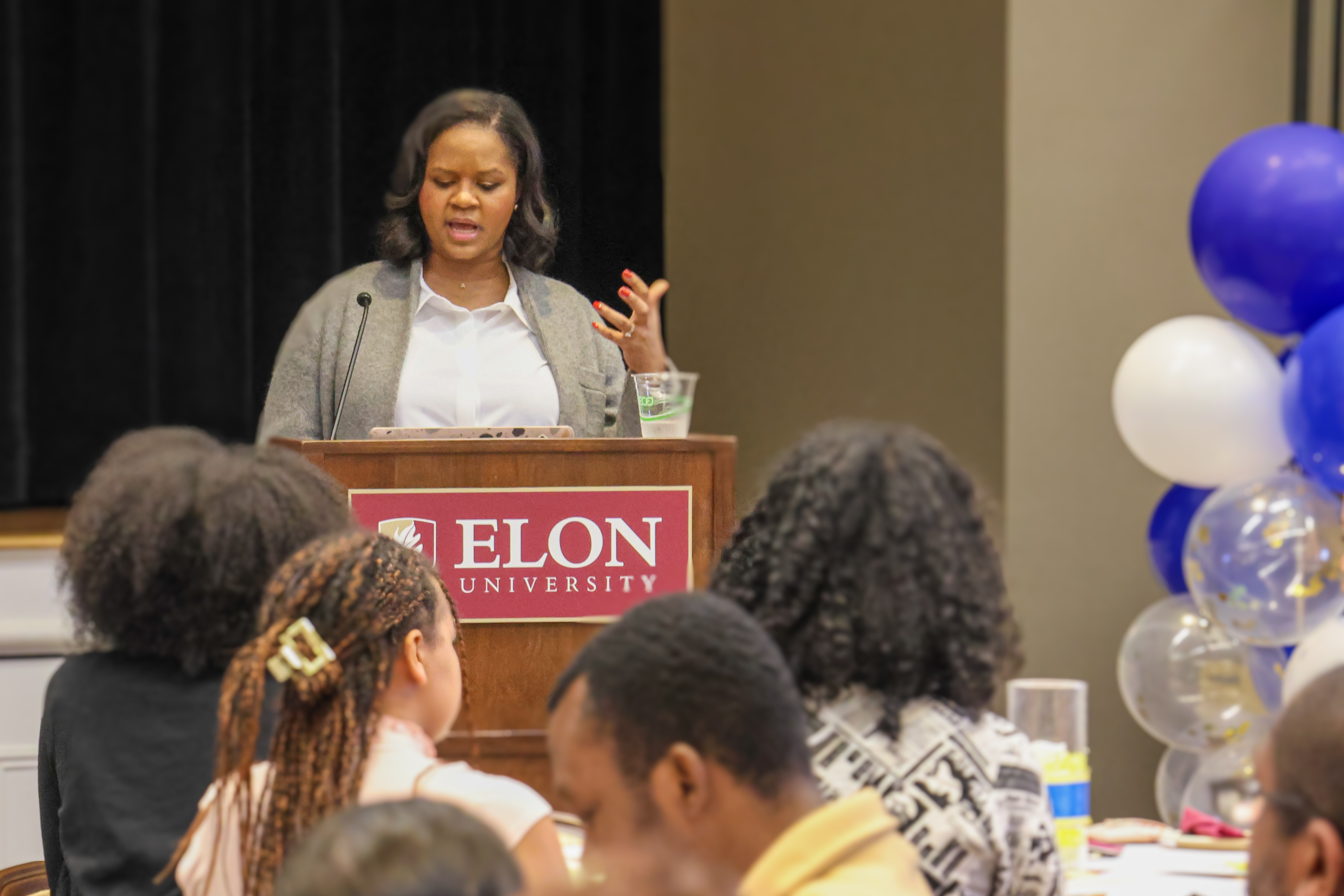Harris encourages attendees to “Make Some Noise!” embracing noise as a catalyst for resilience, unity, and societal change, urging attendees to amplify their voices and rhythms of resilience.
“When I say make some, you say, ‘Noise!’” was the dynamic call and response that keynote speaker Melanie Bullock Harris, director of the Center for Leadership and Community Engagement at American University and former director of the Center for Leadership at Elon, infused throughout her keynote address at the 10th annual Black Solidarity Conference, on Friday, Feb. 23.
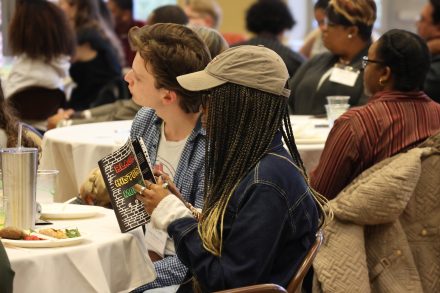 The Black Solidarity Conference is a one-day conference hosted by the Center for Race, Ethnicity and Diversity Education (CREDE) that strives to unite Black-identifying students, faculty and staff by providing a space to discuss Black intersectionality, Black identity and building solidarity. This year’s conference continued the theme of Black History Month celebrations at Elon, “Rhythms of Resilience: One Soul, One Sound,” which focuses on how the elements of Black history, music and culture are interconnected. The theme emphasizes the role of music as a unifying force that bridges varied experiences.
The Black Solidarity Conference is a one-day conference hosted by the Center for Race, Ethnicity and Diversity Education (CREDE) that strives to unite Black-identifying students, faculty and staff by providing a space to discuss Black intersectionality, Black identity and building solidarity. This year’s conference continued the theme of Black History Month celebrations at Elon, “Rhythms of Resilience: One Soul, One Sound,” which focuses on how the elements of Black history, music and culture are interconnected. The theme emphasizes the role of music as a unifying force that bridges varied experiences.
When learning about the Black History Month theme, Harris stated that the simple phrase “make some noise” came to mind. After beginning with empowering affirmations using lyrics from songs such as “On My Mama” by Victoria Monét, she provided a breakdown of the relationship between noise and rhythm and elaborated on the role of rhythm in music and sound.
“The connection between rhythm and noise is a fascinating aspect of music. Sound perception and even cognitive science bridge the gap between what is traditionally considered musical and what is often labeled as non-musical or disruptive,” Harris said. “This relationship highlights our understanding of sound. …Rhythm introduces structure and predictability into sound, even within what we perceive as noise, a rhythmic pattern can transform it into something more cohesive, coherent, and even musical.”
Noise can be associated with disruption, irritation or chaos, Harris said. “However, when we shift our perspective, noise reveals a multifaceted beauty encompassing the realms of music, communication, and innovation in the very fabric of the human experience,” she said.
Different musical genres, such as hip-hop, that were once considered noise have now been transformed into groundbreaking sounds, demonstrating how noise can also be a catalyst for artistic invention and creativity that push the boundaries of what is traditionally considered music, Harris said.
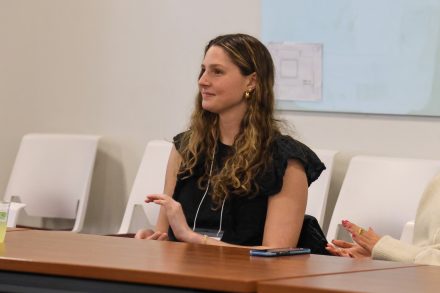
Noise can advocate for social movements and protest as a symbol of voices rising together, Harris said. “The collective voice via change, music or even peaceful protests becomes a powerful tool for visibility and change,” she said. “It speaks to strength, unity, and the refusal to remain silent in the face of injustice. Just as noise can disrupt silence, it can also disrupt complacency, societal norms, outdated practices, business, technology and other things.”
Harris embarked on a personal journey through her deep connection to music, recounting her earliest encounter with the magic of music — listening to “Ease on Down the Road” from “The Wiz,” a Broadway musical and later a film that reimagines “The Wizard of Oz,” and playing the soundtrack before she went to school. “The song ‘Ease on Down the Road’ is the vibrant anthem of perseverance, optimism, and companionship. Its lively rhythm and encouraging lyrics make it a perfect metaphor for resilience, especially in the face of life,” Harris said.
Music is a thread running through her life, such as her first experience at a concert for the artist Coolio and her vivid memory of making her first mixtape. “I remember making the perfect mix tape where I would listen to the Friday night quiet storm to record my favorite tracks on my cassette tape, watching closely when it would get to the end so I could switch it quickly to slide B to continue to record songs without missing a beat,” Harris said.
She tasked the audience with curating the perfect mixtape or playlist and offered her own recommendations of tracks to include. She broke down the lyrics of each song on her own mixtape and provided takeaways that would empower, inspire and ignite resilience within attendees to help them through adversity and spark social change.
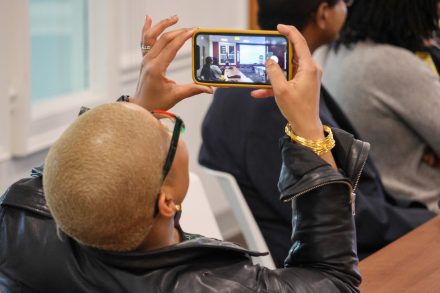
For instance, Harris included on her mixtape the song “DNA” by Kendrick Lamar. This song explores themes of resilience and resistance that celebrate personal factors that make us unique. Playing the song, the lyrics sang throughout McKinnion, “I got, I got, I got, I got loyalty, got royalty inside my DNA.”
“DNA is a powerful statement of self-awareness and self-empowerment,” Harris said. “Kendrick Lamar uses the concept of DNA to not only explore the biological determinants of identity but also to celebrate the cultural, social and personal factors that contribute to who we are.”
Before sharing another song, Harris put on a cowboy hat and said she was entering her country era by introducing “Texas Hold ‘Em” by Beyonce.
“The title of the song refers to the popular poker game and suggests a narrative of taking calculated risks, mastering the art of deception and maintaining a strong front. Much like the strategies employed in poker,” Harris said. “The song cleverly also parallels the game dynamics with personal empowerment and the complexities of navigating life’s challenges.”
Other songs on her mixtape explored messages of joy, strength, togetherness and shared experiences.
Harris was recently diagnosed with cancer, and said music and lyrics of the song “Keep Ya Up” by Tupac, specifically, have played a role in providing her strength and resilience.
“They are a lifeline pulling me from the brink of despair. Reminding me that no matter how fierce the storm, I still have my inner strength. I still have my rhythm of resilience. I still have my noise to share with this world,” Harris said.
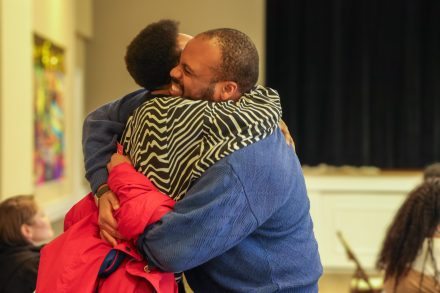
Harris encouraged the audience to continue to make noise and become warriors in the fight to create a more compassionate and inclusive world.
“It’s about making some noise, not just for the sake of being heard, but for the sake of bringing about tangible, lasting impact. So again, I want you all to be encouraged to make some noise. I want you all to be encouraged to create change. I want you all to be encouraged to stand in the rhythms of resilience as you move forward,” Harris said.
After Harris concluded, students shared the dynamic keynote address allowed them to reflect on their inner strength and the role of community while also connecting to Harris’ personal story.
“I think one of the biggest things is about inner strength and the ability to really coalesce that and how that comes from community a lot of times. As a black male, you feel as though you have to do it by yourself,” Student Government Association President Britt Mobley ’24 said. “She expressed how her strength comes from not only her but also the people she surrounds herself with. That’s really important.”
Jordan Smith ’25, education chair for the Black Solidarity Conference, said Harris “spoke to me,” especially as she shared her story about her battle against cancer. “My family has dealt with cancer a lot,” she said. “Hearing the powerful statements that she made about how she has the illness, but the illness doesn’t have her, and she will overcome it, spoke to me.”
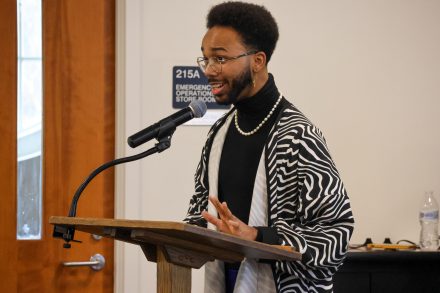
Demetria Hall ’24 impact from the keynote address incorporated her personal connection to Harris while being a leadership fellow. Harris’s address offered a fan opportunity for reflection for Demetria Hall ‘24, who had a personal connection with Harris as a Leadership Fellow at Elon. “It’s a full circle moment being a senior and knowing that she’s back to provide words of upliftment and encouragement. Reflecting on the central message, make some noise, I’m thinking on how I can continue to make noise and how noise looks different in different spaces,” Hall said.
After the keynote address, attendees participated in educational sessions that included “Resilient Rhythms: Soul Listening Lounge,” “Discovering Data in Your Daily Lives,” and “Science Fiction/Social Reality: An Islamic View of Race.”Attendees were also able to engage in roundtable discussions around topics such as intersectional environmentalism and inequities in the legal system. The conference concluded with a mocktail hour.



